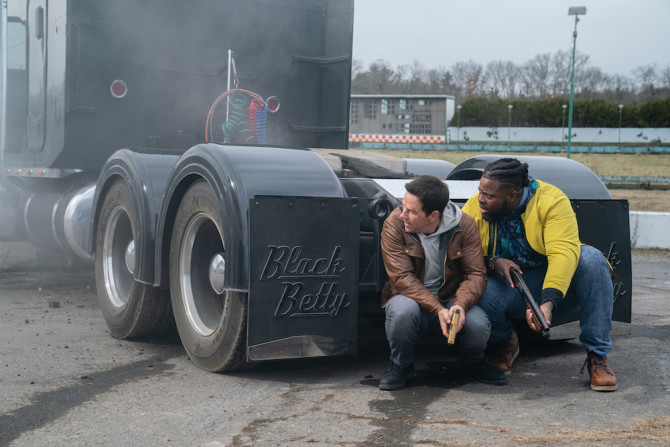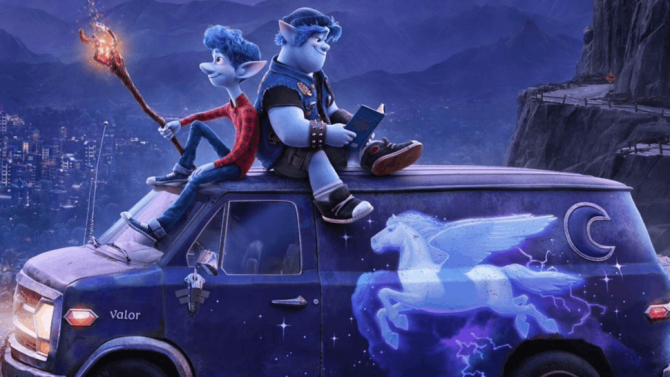Sometimes I think of Netflix as the alcoholic divorced neighbor we use as a measuring stick to feel better about ourselves. Their release strategies continue to both deconstruct and baffle the industry. This week I saw Mark Wahlberg and Eliza Schlezenzer on James Corden talking about a movie they did together and all I could think was, “What movie? They’re not in any movies together.” A few days later, I open up Netflix, and there’s a new movie with Mark Whalberg and Eliza Schlezenzer. Oh, I guess that was the movie?
Usually, studios blanket the country with billboards and trailers for their upcoming films so by the time the actors from the movie show up on talk shows, we know why they’re there. Netflix is saying, “No thank you” as they continue to alter every traditional strategy in the book. For what reason? No one knows. Honestly, I can’t figure out if there’s a plan behind this backwards promotional concept or if they’re making it up as they go along.
Either way, Spenser Confidential felt like one of those movies you hear about that has tons of weird lawsuits preventing it from being released so the studio has to keep it in the vault for several years and then when they finally release it, everything about the film feels strangely out of touch. Except in the case of Spenser Confidential, it wasn’t in the vault for 5 years. It was in it for 20. I mean this movie couldn’t feel more dated if it starred Harold Lloyd.
In that sense, Spenser Confidential represents just how much the movie industry has changed. These quasi-thriller dirty-cop dramas used to be a staple in every studio’s diet. But once special effects got better, TV production value skyrocketed, and the movie star died, it was hard to convince people these films were worth going to movie theaters for.
Which is probably why this film is debuting on Netflix.
And for anyone nostalgic about getting these movies back on the cineplex menu, watching Spenser Confidential may burst your bubble. All of the genre’s weaknesses are on display. Cliched characters. Predictable plot developments. Try-hard tough-guy dialogue.
Here’s the thing. It’s not that you can’t make these movies anymore. But you need to find a way to bring them to the modern audience. And the answer was right there in the film for “Spenser.” When Spenser (Mark Wahlberg), a former cop, gets out of prison (because of course he does) he’s forced to room with an on-the-rise MMA fighter.
There’s your modern thread right there. The MMA fighter (played by “US” star Winston Duke) makes the story modern. But they do NOTHING with his plot line. He’s there to nod his head whenever Mark Wahlberg asks, “Do you want to come with?” This movie should’ve focused on him. It should’ve been him getting out of prison. Not a former cop. WE’VE SEEN THE FORMER COP GET OUT OF PRISON ALREADY. Modernize this. I’m not even telling you this new direction would’ve been great. But it would’ve provided you with an opportunity to give this tired setup some fresh legs.
If you’re looking for a screenwriting tip that’s going to elevate your writing, this would be it. Look for old movie templates then find an element that makes them fresh. Because if all you’re doing is rehashing an old format, everybody’s going to react the same way: “This looks dated.” That’s what happened with Spenser Confidential.
Speaking of blasts from the pasts, we also got the mid-life crisis coach flick, The Way Back, this weekend, a script I reviewed last year which was pretty good. The film, which surprised a lot of people with its 87% RT score, had to call time out to stop the financial bleeding, making just over 8 million bucks.
Look, there have been a lot of complaints over the last decade that there’s nothing to see in theaters anymore unless you like Marvel or Vin Diesel leaping from buildings with a car strapped to his back. But who’s really to blame for this? Movies like The Way Back used to be a staple in theaters. You’d get a couple of them a year. Then people stopped going to see them so studios stopped making them. If you want more variety, you have to support these films. Plain and simple.
That’s what I never understood about this complaint. Every seasoned moviegoer is crying that they don’t make movies like they used to. There’s less and less variety. Well what, exactly, is missing from theaters that if they made them again, you’d go see? I’m serious. I’m asking that question for the comments. Steven Spielberg’s next film is West Side Story. Is it that kind of movie you’re missing? If so, are you going to go see it in theaters? I know I’m not.
If there’s a type of movie that used to be made and released that you miss, that’s the perfect opportunity for YOU to do something about it. Follow the formula I laid out above. Identify the movie type that’s no longer made. Come up with a fresh angle that modernizes it. And write it. Because let’s be real. The reason we didn’t go see The Way Back wasn’t because we’ve given up entirely on that kind of film.
We didn’t see it because it didn’t bring anything new to the table. I remember reading that script and a particular line of description stood out to me with how shocking it was. Here it is paraphrased: “We lean into the cliche because, why wouldn’t we, we’re going to be hitting all of them by the end of this movie.” THAT WAS IN THE SCRIPT! And I get that the writer, who was writing on assignment, was just having some fun. Maybe making an aside he knew the producer would giggle at. But if you want to know why this movie didn’t perform well, look no further than that line.
One of the hardest jobs of being a writer is refusing to settle. Not settling for average characters, not settling for average plot lines, not settling for average plot developments. Not settling for providing the same story people have already seen. Because let’s be honest. It’s much easier to write whatever comes to mind and call it a day. Those moments where you’re sitting on your couch doubting every inch of your story because you’re convinced the script blows and how nothing could ever possibly save it and you try this and try that and you keep going back to the drawing board and you’re just about to give up for good when – BAM! – an idea pops into your head that immediately makes your story ten times better? It’s not fun going through everything up til the ah-ha moment. It’s not fun beating yourself up for a week. Which is why most writers take the opposite approach and stick something in that they’ve seen work in other films, confident that, at the very least, the choice won’t be “bad.” But if you want to challenge others, you have to challenge yourself.
Finally, this leads us to the other major release of the weekend, “Onward,” Pixar’s latest effort, which has left a lot of people either shrugging or meh’ing or both. The film stars two of the most likable actors on the planet, Chris Pratt and Tom Holland, but we unfortunately don’t get to see them.
Personally, I find the story behind the story of this movie to be touching. The writer never met his father and so decided to write a movie about it. It even does what I just said you need to do. Which is come up with a new angle. Onward is unlike any movie Pixar has released before it. So what’s wrong here?
A couple of things. One of the frustrating cruelties of the artistic pursuit known as writing is that just because you try something different doesn’t mean it’s going to work. Most of the time, it doesn’t work because when you write something that’s off the beaten path, it requires you to be a better writer since you’re navigating uncharted territory. There have been many well-meaning writers who have tried something new but didn’t have the writing chops to execute it. While I’ve only seen Onward’s trailers, something about it I can’t put my finger on isn’t clicking. I think it’s the mythology. It feels too light and fluffy. There isn’t any depth there. With that said, I will definitely see this movie when it hits digital. It looks fun.
The second issue is that mainstream animation is one of the least-forgiving genres when it comes to its targeted demographics. Pixar and Disney movies are generally made for two types of people. Young kids and their parents. Onward isn’t that. It’s targeting 12-15 year olds. And I don’t think many 12-15 year olds go to see animated movies. They’re growing up. They’re too cool for school. Going to a Pixar film risks upsetting their street cred.
If you’re going to try something different with feature animation, it’s best to go way to the other extreme so that people understand the film isn’t meant for kids. Like Sausage Party. 12-15 year olds will want to see that because it’s raunchy and outrageous. I will concede that animation isn’t my specialty so take those thoughts with a grain of pink Himalayan salt. But that’s been my experience observing these films over the years. I think Pixar was trying to make something for all those little kids who grew up on their films who were now older. They learned the hard way that all of them would rather play Fortnite and try to be Tik-Tok stars.
Before we end this Monday mash-up, a final reminder that THIS FRIDAY IS SCI-FI SHOWDOWN! If you have a sci-fi script you want to be featured in the showdown, e-mail me at carsonreeves3@gmail.com and include the script, a title, a genre, a logline, and why you think your script deserves a shot. Entries are due this Thursday by 8pm Pacific time.
And of course, make sure you’re getting your big daddy scripts ready. THE LAST GREAT SCREENWRITING CONTEST deadline is June 15th. You can find entry details in the original post. I’ve been thinking about the contest a lot and how there are very few breakthrough “Oh my god, the industry just found an amazing new screenplay!” stories anymore. Let’s create one of those! One of you can do it. I know there’s somebody out there with a big idea that’s got a fresh hook and who takes chances and their script isn’t quite like anything out there. Let’s bring this script to the town together and rock the world by turning it into a film. You’ve got three months left, guys. Keep writing!




